I always chuckle a little bit whenever someone asks me the question – often with furrowed-brow and misplaced intensity: “Can the ELCA be multicultural?” It’s a tough answer. Internal estimates place the whiteness of our denomination at 94.7%. This summer’s sobering PEW research study of ethnic diversity in US religious communities has us at 96% white, making us the whitest church in the United States despite nearly three decades of trying to be otherwise. So sure, there is cause for worry, but having been in the vanguard of this very discussion for some time now, I always sport a sly grin whenever this topic pops up – because there is some good news that me and my Black and Brown ELCA’ers know that many white ELCA’ers don’t and it invariably twists the corners of my mouth a jaunty angle:
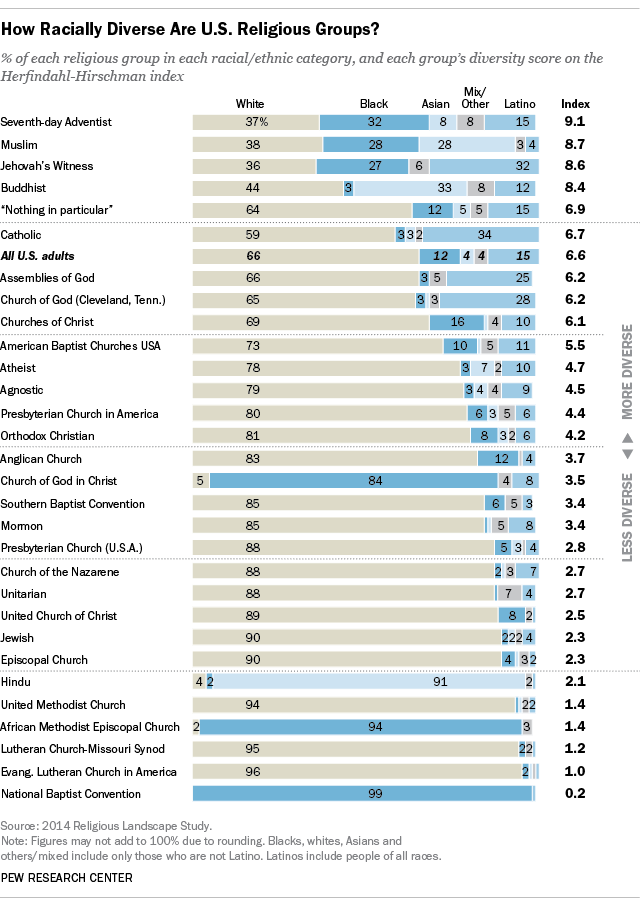
The ELCA already is multicultural.
It’s true. Firstly, I know this because since beginning Th.M./Ph.D. studies at the Lutheran School of Theology at Chicago in 2013 virtually all of my guides and mentors have been people of color. My advisor is from India, my “step advisor” is Puerto Rican, and my mentor-of-mentors is African American with roots in Jamaica. What’s more, if you have two free days to attend the ELCA’s three-day Global Musician Training in Chicago you will marvel – with its more than 20 ethnic groups and languages all singing and crying and laughing together – at the broad range of voices and harmonies and dissonances that echo under our little church’s roof. Don’t believe me? Watch this video of last year’s training – and if you don’t blink you might even witness the author shaking maracas and playing viola!
But even more encouragingly, did you also know that of the 512 churches and synodically authorized worship communities that have joined the ELCA since 1988, 365 of them are either from communities of color or are racially mixed? In short, in our denomination’s brief history, 68% of all new growth is ethnically diverse, while only 32% of it is exclusively white. Though most ELCA communities may have resisted the ever diversifying reality of the US, the new mission starts have embraced it. For whatever reasons, ethnic diversity is in their ecclesial DNA from the get-go and it clearly shows. So while we may now be 96% white, the future of the ELCA is unquestionably multicultural. These statistics prove it. So when I say that that the ELCA already is multicultural, this is why. And it’s pretty great.
But now for the bad news, the hard and depressing news:
Those making the diversity in our church possible have paid a VERY high price.
To illustrate this, and I ask this especially of the white readers here at Let’s Talk, read the following paragraph and ask yourself how you could do ministry under these conditions:
Is it possible to continue respecting a colleague after she reacts that you’re not “a real Latino” let alone “a real Lutheran”? How would your church after your first time through Candidacy was marred by racism – and then heard that a friend had experienced the exact same treatment by the exact same committee 10 years later?
If a white bishop asks you for help placing more first-call pastors of color and then doesn’t follow through on any of his commitments, when he asks you for help a second time do you give it?
How do you continue to worship with your community after you learn that your black husband was never paid for his musicianship while the white musicians were?
How long do you marinate in student debt and despair while awaiting a first call – one year, two years, three or four…? – after watching most of your white fellow-graduates sign their first contracts within 6 months, and everyone else within one year?
And after years of being mobbed by white colleagues every time you try to speak honestly about how you’ve been racially profiled or marginalized and demeaned, do you stay in your denomination and keep being abused or do you jump ship and potentially destroy your entire career and the security of your family and future?

For months I have listened to these stories from ELCA leaders of color of every sort from nearly all nine of the ELCA’s regions – and for all their permutations there is one thing that unites every one: regular racial harassment from white colleagues is the norm and most have chosen to be silent about it.
However, since the massacre at Mother Emanuel AME in Charleston this summer a dam has burst for many people of color in the ELCA. Since not only were victims Senior Pastor Clementa Pinckney and Associate Pastor Daniel Simmons both graduates of the the ELCA’s Lutheran Theological Southern Seminary, but even the shooter Dylann Roof himself is a baptized and confirmed ELCA member. For many this was truly the last straw.
So now leaders of color are starting to break the silence. Tiffany Chaney, a bi-vocational Pastor Developer in Montgomery, Alabama shared powerful testimony of how the hardest thing she has ever done in life is to be “both black and Lutheran.” I myself wrote an essay relating the trials of people of color in the ELCA to Luther’s theology of the cross. And then there is the ELCA’s Program Director for Young Adult Ministry, Rozella Haydée White, and her harrowing experiences after admitting the burdens of her racial estrangement before an audience of white ELCA pastors.
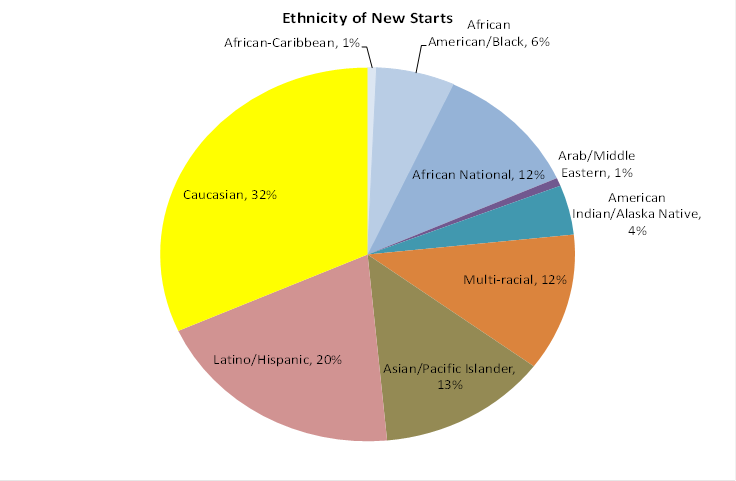 We may be few, but over time more and more voices will come forward, and I know that our concerns will not be denied or easily mollified. The ELCA’s progress on diversity may have firm root, but if our denomination truly wishes to continue expanding ministries among communities of color it must do more. It must also work to bring justice and healing to the thousands of people of color in our denomination who have suffered much from working in such a white church.
We may be few, but over time more and more voices will come forward, and I know that our concerns will not be denied or easily mollified. The ELCA’s progress on diversity may have firm root, but if our denomination truly wishes to continue expanding ministries among communities of color it must do more. It must also work to bring justice and healing to the thousands of people of color in our denomination who have suffered much from working in such a white church.
It is the only Christian thing to do.
So what next?
For starters raise a microphone to the voices of color in the ELCA that have so often been marginalized and to allow us to boldly lament for what we have been through. I specifically use the term “lament” here. As I have suggested elsewhere, when people of color talk about their pains and sufferings never treat it as a discussion. Rather, understand it as lamentation – a moment when we are crying out for justice and healing before both God and humanity so that we may be raised up to new life from the burden of our trials. Seeing our testimonies as lament, will also help ensure that we are not shut up – for someone engaged in a discussion can be debated, queried, or even silenced, but you can do no such thing to someone who is lamenting.
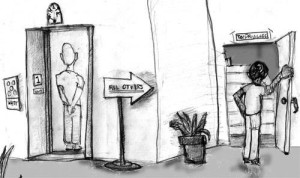
Being silenced is often the most common injury we face when we speak openly of our racial harassment Understanding our testimonies as lamentations makes it hard – indeed impossible – to see interrupting or interrogating our testimony as anything other than what it truly is: un-Christian. Consequently, understanding our testimonies as lamentations can then aid sympathetic white leaders and parishioners in the ELCA to acknowledge us and give us the space to vent and grieve, space that we are almost always denied and so desperately need.
And now, as for how the church can ensure our lament makes a difference:
- Have Church-Wide leadership initiate a survey of people of color and racial harassment, asking them if they’ve ever made an official grievance due to racism – then asking what happened if they had, and why they chose to stay silent if they hadn’t. Record the data and report back. It could even be announced in another webcast on the ELCA’s home page.
- For that matter, have a “Conversation on Race” that focuses specifically on the racism that people of color have dealt with in our church, and use the conversation to expose to the realities that we people of color face every day to the 96% white majority of the ELCA.
- Deeper yet, as we did a massive study on sexuality, do a similar study on race relations within the ELCA. It is wonderful that the leadership on Higgins road has condemned the world’s racism so boldly and unambiguously. Now we need to turn the lens inward and clean up our own house. Having these hard conversations in every synod and every parish brave enough to do so would go a long way in acknowledging the trials of Black and Brown church leaders and give them just that much more acknowledgment and power as they continue in their ministries. And as for parishes and synods that don’t want to ask these questions, ask them why.
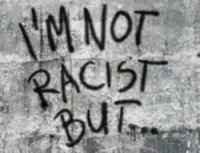
There is much to be happy about, even in addition to the good news I mentioned in the beginning of this article. In direct response to last summer’s Pew Study the February issue of The Lutheran is going to have a feature on multicultural congregations in the ELCA. Following-up their “Confronting Racism” conversation in the summer on Thursday, January 14, 2016, Bishop Eaton and ELCA Church Council member William B. Horne II had another such chat “Confronting Racism: A Holy Yearning” focusing on racism and the US criminal justice system. I can personally speak some good things about our synod here in Chicago as well – as all of the African-American graduates of the M.Div program at LSTC in recent years now are following calls in this synod. There is cause for rejoicing.
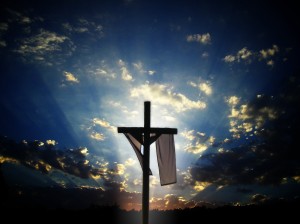
And just because many people of color in our church have had and are having a hard time, we are not going anywhere. Yes, there are trials. Yes, we get worn down. But never ever forget – we love our work. We accept and embrace the challenges because we know that if we remain silent in “such a time as this” (Esther 4:14) when so many in our communities are perishing then we would be in total denial of our call and betraying the love and power that the Gospel has given us. We cannot do that. The question then is, my beloved white brothers and sisters, will you answer our call – our lament – too? Will you come with us, weep with us, at the foot of the cross? Will you come and be with us at the feet of our Lord?

